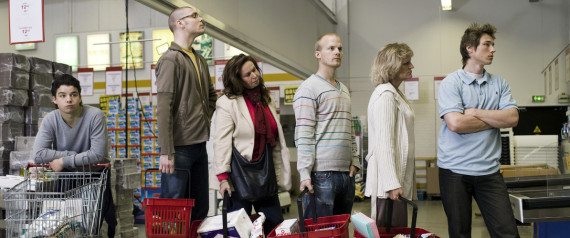The 11 Worst Types Of People You Get Stuck Behind In Line At The Grocery Store


Grocery shopping is one of those tasks that can be really enjoyable (as long as you don’t live in New York City where it’s a total nightmare) or really painful. If you’re prepared with a list and can take your time, shopping in the grocery store can be fun and rewarding. If you’re in a rush, however, or if the store is crowded, it can quickly become a dreaded task you vow to never do again. And the worst part is often the check-out line.
We’ve all been there. You’ve carefully gotten just the right amount of items to check out at the express lane, only to find the person in front of you is totally disregarding the rules and has 40 items when he should have no more than 10.
It’s enough to make you swear off the super market forever. Here are 11 types of people who stand in front of you in line at the grocery store.
1 The person who needs to know the cashier’s entire life story.

He doesn’t seem to believe the people behind him have a life.
2 The person who uses a million coupons.

We respect you, but we don’t want to stand behind you.
3 The person who makes everyone behind her wait while she fishes through her purse for an hour.

She’ll take her sweet time finding her wallet, even though she’s had 10 minutes in line to get it out of her bag.
4 The person who realizes she’s forgotten something.

She makes everyone wait while she dashes to grab that final item, and she takes forever. Unacceptable.
5 The person who should have gone through the express lane.

What were you thinking?!
6 The person who spends way too long crafting the perfect signature.

You’re joking, right?
7 The person who will do anything to get in front of you in line.

As if other people in the store aren’t also in a rush.
8 The person who asks a thousand questions in the store, and still can’t make her mind up by the time she checks out.

Spare us, please.
9 The person who makes you feel bad about your groceries.

Because all she has are fruits and vegetables.
10 The person with 40 items in the express lane.

He may play dumb, but he knows exactly what he’s doing.
11 The person who thinks she can cut you in line because she has an adorable child.

Your child may be adorable, but we were here first.
Courtesy of Fark.com






















Recent Comments